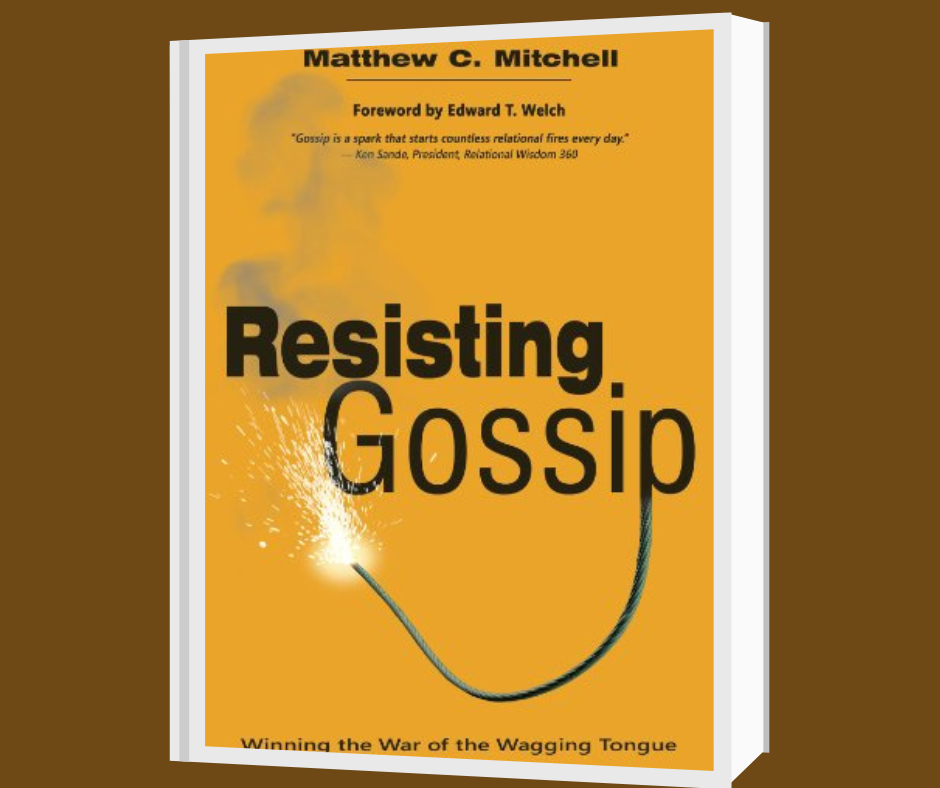Book Reviews
Resisting Gossip: Winning the War of the Wagging Tongue, by Matthew C. Mitchell | Review by Rosa Byler

Gossip is probably one of the most under-addressed of all the Romans-seven-style sins that Christians hate but fall into regularly anyway. Although mentioned frequently in the Bible, gossip is the focus of surprisingly few books or sermons. Pastor Matthew Mitchell addressed the subject early in his ministry and later preached a nine-sermon series that eventually became this book—and the church he pastors does not currently have a problem with gossip. (He says they are “committed to spiritual unity and have learned a few things along the way.” Mitchell’s “few things” should give the rest of us a head start in the learning process.)
Resisting Gossip is short and simply-written but well-organized. Its four divisions take the alliterative approach: Recognizing Gossip (what is it?); Resisting Gossip (not just prohibitions but positive moves); Responding to Gossip (when others have done it to you); and Regretting Gossip (when you have done it to others). Mitchell does an admirable job of staying on task in each section. A bonus chapter at the end instructs church leaders in the cultivation of a “gossip-resistant church.”
Defining gossip biblically is essential to recognizing it. Mitchell sums up gossip as “bearing bad news behind someone’s back out of a bad heart.” (23) Not surprisingly, the book of Proverbs plays a major role in unpacking this description. Proverbs is also the source of Mitchell’s five classes of gossips: spies, for whom knowledge of others’ secrets is power; grumblers, who vent and criticize; backstabbers, whose complaints are motivated by a desire for revenge; chameleons, who gossip from a desire to fit in; and busybodies—idle, bored, and pursuing entertainment. Although each reader will recognize a particular tendency in himself, these classifications also have situational variables.
The second section starts with a story, prefaced by a confession: “I was the guy who was writing a book on resisting gossip, and look what I’d just done!” (63) Mitchell’s pointers for resisting gossip are not new (believing the best, commending the commendable, remaining silent, talking to people instead of about them), but he ties them to the gospel truth of putting off/putting on, or repenting and obeying.
“You will be gossiped about” is the blunt opening line of the section on responding to gossip. Mitchell references the story of David and particularly his responses in prayer, helpfully compiled for us in the psalms. On-the-ground interactive responses include overlooking the offense, confronting the offender, returning good for evil, or a combination of these. While all gossip is sinful, it ranges in severity from “idle chat” to “malicious betrayal” and calls for differing appropriate actions.
Giving in to gossip causes remorse not only because it is sinful, but because it hurts people and is irretrievable. In addition to repentance, Mitchell emphasizes receiving Jesus’ cleansing rather than living with condemnation and regret. (He finds current Jewish teaching on gossip somewhat helpful, but grace-less. Many Christians live under a similar O.T. mentality, which Mitchell challenges with a sermon on grace and salvation.) Attempting to retract gossip should be done carefully and with discernment. Apologizing to every person involved is not always necessary and may even cause harm.
Resisting Gossip provides not only a book and a series of sermons about gossip but also its own study guide and a list of further resources. In keeping with gossip-resistant principles, Mitchell lists the good resources but provides a link to access the ones he finds lacking. Given that technology can help us gossip more easily than ever before, all of us need this tool for discipleship! (Parents, initiate discussions with your children as you read. Mitchell’s children benefited from dinner table conversations while the book was still in the writing process.)